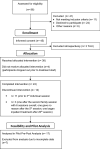Mentalization-based treatment for adolescents with conduct disorder (MBT-CD): a feasibility study
- PMID: 36434148
- PMCID: PMC9702655
- DOI: 10.1007/s00787-022-02113-4
Mentalization-based treatment for adolescents with conduct disorder (MBT-CD): a feasibility study
Abstract
Conduct disorder (CD) is a common psychiatric disorder in youth characterized by persisting norm-violating or aggressive behavior. Considering high individual and societal burden, feasible and effective psychotherapeutic treatment is desirable. Yet, treatments and research in this patient group are scarce. This study investigates the feasibility of mentalization-based treatment for adolescents with CD (MBT-CD) in terms of acceptability of MBT-CD and scientific assessments by participants as well as necessary organizational resources to conduct a consecutive randomized controlled trial (RCT). Recruitment, adherence and treatment session numbers were descriptively analyzed. Treatment evaluation interviews were qualitatively analyzed. A subset of sessions of therapists without prior MBT experience was rated for MBT adherence. Quantitative data were used to plan a consecutive RCT. Pre to post treatment changes in diagnosis and self-reported aggression, mentalizing and personality functioning were preliminarily analyzed. N = 45 adolescents with CD were recruited. 43% dropped out. Acceptance of scientific assessments was somewhat lower than therapy adherence (questionnaires filled out by ~ 80% of adolescents in treatment), and low at follow-up (25% of treatment completers). Mean session number was 30.3. Most treatment completers were satisfied with MBT-CD. Referrals mainly came from child and youth services and psychiatry. Nine of 16 sessions rated for MBT adherence were adherent. A priori sample size estimation for a prospective RCT with a drop-out rate of 43% yielded a sample of N = 158 to detect an effect f = .15 with 80% power in a repeated measures ANOVA. Pre-post analyses revealed diagnostic improvement in 68%. Of self-reported data, empathy pathology improved. Findings provide a sound basis for a consecutive feasibility and pilot RCT. TRIAL REGISTRATION: Clinicaltrials.gov, registration number NCT02988453, November 30, 2016, https://clinicaltrials.gov/ct2/show/NCT02988453.
Keywords: Adolescents; Conduct disorder; Feasibility; Mentalization-based treatment.
© 2022. The Author(s).
Conflict of interest statement
SH, LK, JV and ST are members of the German-speaking occupational association MBT-D-A-C-H, which distributes and develops MBT trainings, supervision and treatments.
Figures
Similar articles
-
Mentalization-based treatment for adolescents with conduct disorder (MBT-CD): protocol of a feasibility and pilot study.Pilot Feasibility Stud. 2021 Jul 2;7(1):139. doi: 10.1186/s40814-021-00876-2. Pilot Feasibility Stud. 2021. PMID: 34215323 Free PMC article.
-
[What Did You Like About the Therapy? - A Qualitative Study on the Evaluation of Mentalization-Based Treatment for Adolescents with Conduct Disorder].Prax Kinderpsychol Kinderpsychiatr. 2021 Jun;70(5):386-402. doi: 10.13109/prkk.2021.70.5.386. Prax Kinderpsychol Kinderpsychiatr. 2021. PMID: 34187334 German.
-
Mentalization-based treatment in groups for adolescents with borderline personality disorder: a randomized controlled trial.J Child Psychol Psychiatry. 2020 May;61(5):594-604. doi: 10.1111/jcpp.13152. Epub 2019 Nov 8. J Child Psychol Psychiatry. 2020. PMID: 31702058 Clinical Trial.
-
Mentalization-Based Treatment for Adolescents (MBT-A).Psychodyn Psychiatry. 2024 Dec;52(4):542-562. doi: 10.1521/pdps.2024.52.4.542. Psychodyn Psychiatry. 2024. PMID: 39679703 Review.
-
Mentalization-Based Treatment for Personality Disorders: Efficacy, Effectiveness, and New Developments.Curr Psychiatry Rep. 2019 Mar 9;21(4):25. doi: 10.1007/s11920-019-1012-5. Curr Psychiatry Rep. 2019. PMID: 30852694 Review.
Cited by
-
Patient characteristics of completion and dropout of mentalization-based treatment for adolescents with conduct disorder.Front Psychol. 2024 Oct 2;15:1390169. doi: 10.3389/fpsyg.2024.1390169. eCollection 2024. Front Psychol. 2024. PMID: 39417025 Free PMC article.
-
Atypical functional connectome is associated with low reflective functioning in incarcerated adolescents.Front Psychiatry. 2025 Jan 10;15:1385782. doi: 10.3389/fpsyt.2024.1385782. eCollection 2024. Front Psychiatry. 2025. PMID: 39866687 Free PMC article.
-
Antisocial personality disorder and therapeutic pessimism - how can mentalization-based treatment contribute to an increased therapeutic optimism among health professionals?Front Psychol. 2024 Feb 21;15:1320405. doi: 10.3389/fpsyg.2024.1320405. eCollection 2024. Front Psychol. 2024. PMID: 38449745 Free PMC article. Review.
-
Enhancing mentalization by specific interventions within mentalization-based treatment of adolescents with conduct disorder.Front Psychol. 2024 Jan 8;14:1223040. doi: 10.3389/fpsyg.2023.1223040. eCollection 2023. Front Psychol. 2024. PMID: 38259532 Free PMC article.
References
-
- Ravens-Sieberer U, Wille N, Bettge S, Erhart M. Psychische gesundheit von kindern und jugendlichen in deutschland: ergebnisse aus der BELLA-Studie im Kinder- und Jugendgesundheitssurvey (KiGGS) Bundesgesundheitsblatt Gesundheitsforsch Gesundheitsschutz. 2007 doi: 10.1007/s00103-007-0250-6. - DOI - PubMed
-
- American Psychiatric Association. Diagnostic and Statistical Manual of Mental Disorders (DSM-5) 2013. http://www.dsm5.org/Pages/Default.aspx. - PubMed
Publication types
MeSH terms
Associated data
LinkOut - more resources
Full Text Sources
Medical


